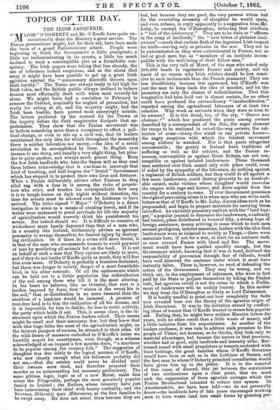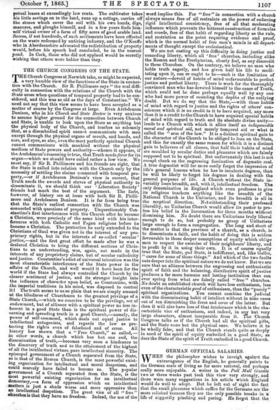TOPICS OF THE DAY.
THE IRISH JACQUERIE.
" MAJOR " O'DOHERTY and Mr. O'Keeffe have quite un- intentionally done the Ministry a great service. The Fenian prosecutions might, but for their aid, have been made the basis of a grand Parliamentary attack. People were beginning to think the Government a little precipitate, a little too indiscriminating in its arrests, a little too much inclined to treat a contemptible plot as a formidable con- spiracy. The Irish papers were taking that line already, the use of informers looked suspicious, and as the alarm died away it might have been possible to get up a great Irish agitation against the " unnecessary discredit thrown upon Irish loyalty." The Tories are always ready to bid high for Irish votes, and the British public always inclined to believe treason most effectually dealt with when most severely -let alone. We might have had a resolution in February to censure the Cabinet, nominally for neglect of precaution, but really for acting at all, and the majority might, had the Irish been hostile, have proved most annoyingly minute. The letters produced by the counsel for the Crown at the inquiry before the Cork magistrates dissipate that ap- prehension. They show that the Fenian movement was at bottom something more than a conspiracy to effect a poli- tical change, or even to stir up a civil war, that its leaders entertained the only idea for which throughout the monarchy there is neither toleration nor mercy,—the idea of a social revolution to be accomplished by force. In English eyes treason is one thing, and usually a very slight thing, but plun- der is quite another, and always much graver thing. Even the few Irish landlords who hate the Saxon will as they read these letters acknowledge that it was time to interrupt that kind of teaching, and half forgive the " brutal" Government which has stepped in to protect their own lives and fortunes. When a Fenian deliberately advises other Fenians to drop oiled rag with a fuse in it among the ricks of proprie- tors who evict, and teaches his correspondents how easy it is to hough horses on dark nights without detection, the time for arrests must be allowed even by Irishmen to have arrived. The letter signed " Major" O'Doherty is a direct instigation to arson as a means of creating terror, and if its writer were sentenced to penal servitude for life the majority of agriculturists would scarcely think his punishment too severe. Nor indeed should we. It is difficult to conceive of wickedness more basely depraved than that of a man who, in a country like Ireland, deliberately advises an ignorant peasantry to avenge themselves for fancied injury by destroy- ing civilization. Or if there be a crime still more brutal, it is that of the man who recommends tenants to avoid payment of rent by mutilating all animals fed on the land. It is not on behalf of such a man that Tory squires are likely to move, and if they do not loathe O'Keeffe quite as much, they will fear him even more. O'Doherty is probably a brainless declaimer, but there was danger to society, danger of a most formidable kind, in his abler comrade. Of all the enticements which can be held out to a Celtic population the redistribution of the soil among those who till it is the most alluring. In his heart he believes, like an Oriental, that rent is a burden imposed by force, that " whose is the sweat his is the soil," that re-distribution is no more immoral than the abolition of a land-tax would be immoral. A promise of rent-free land is to him the realization of all his dreams, and it is impossible for him to dislike, far less to resist actively, the party which holds it out. This, it seems clear, is the in- strument upon which the Fenian leaders relied. Their means might be small and their associates few, but they knew that with this huge bribe the mass of the agriculturists might, on the faintest prospect of success, be attracted to their sides. Of the wild dream of massacre embodied in O'Keeffe's letter we heartily acquit his countrymen, even though, as a witness acknowledged at an inquest a few months since, " a murderer do be popular among the country folk." The suggestion of slaughter was due solely to the logical acumen of O'Keeffe, who saw clearly enough what his followers probably did not see,—that the estates could never be divided until their owners were dead, and therefore proposed their murder as an uninteresting but necessary preliminary. The same pitiless logic, logic as of a new Marat, made him select the Fitzgeralds, perhaps the most genuinely popular family in Ireland ; the Butlers, whose tenantry have just been entertaining their chief with hearty cordiality, and the Brownes, Hibernicis ipsis Iliberniores, as the first families to be swept away. He does not select them because they are
bad, but because they are good, the very persons whom but for the overruling necessity of slaughter he would spare, and even refuses, in reply apparently to a suggestion from Mr. Luby, to exempt the O'Donoghue, believing that chieftain a " tool of the aristocracy." They are to be slain as " officers in the army of landlords," the " new tribes of plebeian land- owners"—mark that curious flash of the ingrained Irish respect for birth—serving only as privates in the war. They are to be exterminated as they were exterminated in France, not as. bad or good men, but as " members of an institute incom- patible with the well-being of their fellow-men."
This is the very talk of Marat, of the man who asked only 200,000 heads to regeherate France and society, and we know of no reason why Irish cottiers should be less sensi- tive to such incitements than the French peasantry. They are less bloodthirsty because less oppressed, but O'Keeffe was just the man to keep back the idea of murder, and let the peasantry see only the chance of redistribution. That this temptation had been held out is almost certain, for no other could have produced the extraordinary " insubordination reported among the agricultural labourers of at least two counties. Why work as servants when they were so soon to be owners ? It is this dread, too, of the cry, " Guerre aux- chateaux !" which has produced the panic among owners described by a correspondent of the Star, the eager clamour for troops to be stationed in out-of-the-way corners, the col- lection of arms—thirty-five stand in one private house— the angry suspicion with which the faintest movement among cottiers is watched. Nor is that panic altogether unreasonable ; the gentry in Ireland have traditions of suffering as well as the cottiers, and the Fenian re- sources, contemptible as against Great Britain, are not con- temptible as against isolated landowners. Three thousand. men scattered over Cork armed only with pikes could, even if aided by the sympathy of the labourers, do nothing against. a regiment of British soldiers, but they could do all against a few score landowners, could destroy property to an incalcul- able extent, make victims whose slaughter would convulse the empire with rage and horror, and drive capital from the country for a century to come. If ever Government possesses the rightof preventing crime it is when men who can write such letters as that of O'Keeffe to Mr. Luby, discuss ideas such as he propounded, and begin to prepare materials for carrying them into effect. An excitable peasantry smitten with the "land hun- ger," a popular journal to denounce the landowners, a radically bad tenure, pikes distributed in boxes of fifty, a strong hope of foreign assistance, money arriving in sums which to such men seemed prodigious, isolated mansions, leaders with the idea that. landowners were as inimical to society as Thugs,—there were materials here, if not for a war, at least for an outburst suck as once covered France with blood and fire. The move- ment would have been quelled speedily enough, but the Government which, knowing that it was at hand, declined the responsibility of prevention through fear of ridicule, would have well deserved the sentence under which it must have instantly fallen. There is, however, no need of defending the action of the Government. They may be wrong, and we think are, in the employment of informers, who were in fact. paid by the State to perjure themselves by taking the Fenian oath, but agrarian revolt is not the crime to which a Parlia- ment of landowners will be unduly lenient. In this matter we may trust the O'Donoghue as freely as Lord Palmerston.
It is hardly needful to point out how completely the facts now revealed bear out the theory of the agrarian origin of Irish discontent. It was to the irritation caused by conflict- ing ideas of tenure that O'Keeffe trusted to secure him popular aid. Failing that, he might have written Maratist letters for years, with no other result than a little waste of money, and a little isolation from his acquaintance. As another of the leaders confesses, it was vain to address such promises to the people of Ulster, not because, as he thinks, they look only to material advantages, but because the tenure in that province, whether bad or good, suits landlords and tenantry alike. But- tressed round with small proprietors or tenants contented with their holdings, the great families whom O'Keeffe threatens would have been as safe as in the Lothians or Sussex, and the first man to whom O'Doherty preached incendiarism would have given him up to the police. It is in the removal of this cause of discord, this jar between the convictions of two civilizations upon a vital point, that we must seek the suppression of those agrarian outrages which the Fenian Brotherhood intended to reduce into system. In Aberdeenshire, we have been told—we do not personally know—the landlords have of late years encouraged working men to turn waste land into small farms by granting per- petual leases at exceedingly low rents. The cultivator takes his little savings on to the land, runs up a cottage, carries off the stones which cover the soil with his own hands, digs, manures, and ploughs himself, and in a few years finds him- self virtual owner of a farm of fifty acres of good arable land. .Scores, if not hundreds, of such settlements have been effected on the waste redeemed by untiring industry, and the O'Keeffe 'who in Aberdeenshire advocated the redistribution of property 'would, before his speech had concluded, be in the nearest pond. In Cork, those who did not applaud would be secretly wishing that others were bolder than they.































 Previous page
Previous page